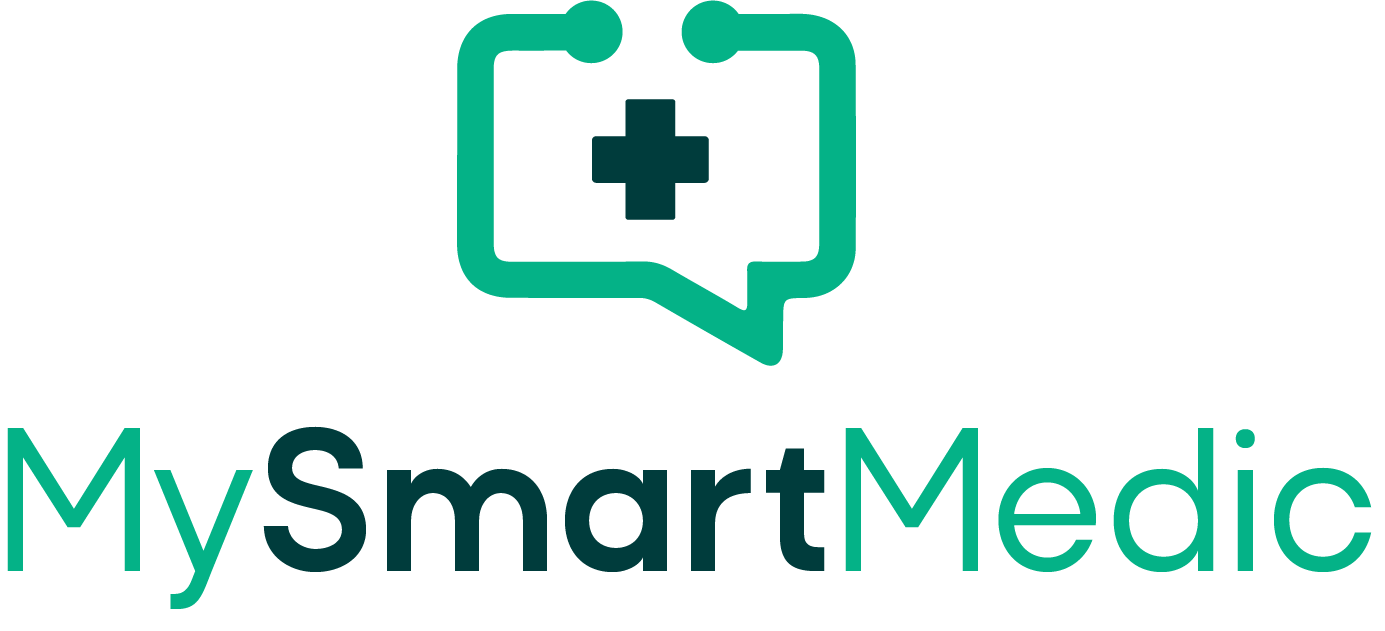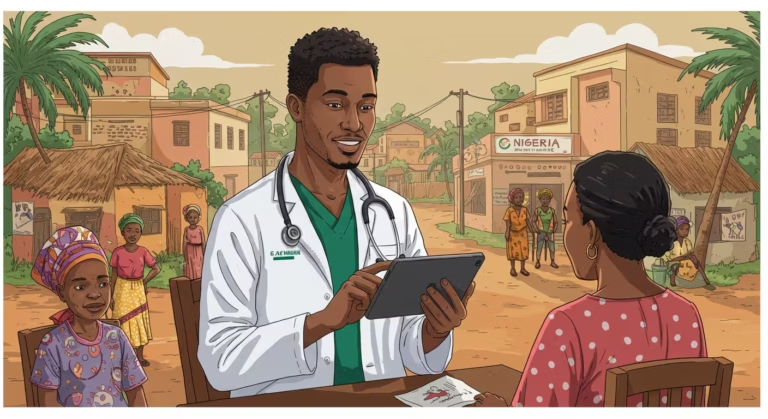Top 10 Benefits of Telemedicine for Nigerians
In this article, you will discover the top 10 benefits of telemedicine for Nigerians. We will explore key advantages of telehealth and how it transforms healthcare access today.
Do you know that you can consult a doctor in Nigeria without stepping into a health facility?
Because telemedicine offers you healthcare services without walking out of your house. In essence, while you are sitting on a sofa in your home, you get access to quality healthcare access.
According to Statista Market Insights 2024, The revenue from the Digital Health Market in Nigeria is projected to reach US$645.36m in 2025. This implies that there is a huge opportunity in the Telemedicine industry.
In a developing country with limited access to healthcare delivery, there are benefits of using telemedicine in Nigeria.
The goal of telehealth is to provide healthcare access anywhere you are. As such, distance becomes the least limitation to receiving healthcare.
Despite the challenges that come alongside using technology in healthcare,Telemedicine Offers numerous benefits in the digital Healthcare Nigeria.
With this, let’s delve into the advantages of Telemedicine Nigeria.
Top 10 Benefits of Using Telemedicine in Nigeria (2025 Guide)
Some of the benefits of utilizing Telemedicine in receiving healthcare in Nigeria include:

1. Unmatched Accessibility
In providing healthcare services, there is a huge gap of accessibility especially for individuals in rural areas.
However, the introduction of innovative technology through telemedicine is bridging the accessibility gap in the health sector. Cancer patients can receive follow up care
Furthermore, telemedicine provides better access to specialists. Individuals and health workers can seek the guidance and consultation of a specialist in a different location. The application of telecommunication technology reduces the cost of receiving a specialist’s healthcare delivery.
Instead of preparing and visiting the hospital to meet a specialist, everyone gains unmatched access that reduces the bottlenecks to receiving specialty care and guidelines. Telemedicine enables you to gain expert health services from wherever you are putting off the limitation of geographical distance.
2. Significant Cost Savings
Visiting a health facility to receive healthcare incurs significant expenses especially for individuals living in distance locations. In the absence of an emergency, telemedicine cuts the indirect cost of seeing a doctor in a hospital. Indirect costs include travel fare and expenses and lost pay due to being absent from work.
According to the 2023 publication in JAMA Open Network, “the estimated mean total cost savings ranged from $147.4 to $186.1 per visit” among cancer patients who are not elders. This suggests that telehealth delivery can reduce the financial burden of cancer care and improve healthcare delivery.
Seeking for MySmartMedic digital healthcare Nigeria makes it easier and less costly to seek healthcare.
3. Time Efficiency
Leaving the house or office earlier for hospital appointments is the norm in in-patient hospital visits. From driving through a distance and waiting to see a doctor takes much time. In some cases, due to delays and queues in the hospital, patients tend to spend more time than planned in an attempt to see a doctor. However, the story and experience is different in Telemedicine.
Accessing healthcare from your location without walking into a hospital is a sure way to maximize time and achieve set goals. Using Information telecommunication devices to get medical help and consultation saves you from time toxicity and keeps you off the road, traffic, long queues, and crowded waiting rooms.
One of the benefits of telemedicine is that it saves you from the stress of dragging yourself to the hospital in your poor state of health. At the end, you receive the medical care that you need conveniently with flexibility.
Online doctor consultation in Nigeria through MySmartMedic helps people with limited work flexibility access healthcare, even with busy or tight schedules
With frequent hospital visits, follow-up appointments, prolonged recovery periods, emotional strain and disruption of daily routines that come with in-person healthcare delivery, combining telemedicine and hospital visits can give better outcomes.
4. Enhanced Safety & Reduced Infection Risk
High risk patients with compromised immune systems can get pathogen exposure and easily get infection in addition to their initial health challenge. Knowing well that a healthcare facility contains individuals with various diseases and health challenges, it is imperative to utilize telemedicine in protecting these vulnerable individuals.
Since, there is risk of getting Healthcare Acquired Infection during medical appointments, vulnerable populations can seek and access medical care using easy-to-use technology gadgets like the smartphone.
Receiving comprehensive consultation from the comfort of the home saves one from stress associated with in-hospital visits. Comprehensive consultation services include reviewing medical history, undergoing lab tests, and getting e-prescription.
Follow-up visits of individuals with infectious diseases is a health concern to both patients and health workers. As such, remote healthcare delivery can improve the quality of care and prevent the spread of infection in a healthcare facility.
Therefore, telemedicine contributes to continuous care while reducing the risk of getting infection. It reduces staff and patients exposure to communicable diseases like surgical site infection, respiratory tract infection, Abscess, and blood stream infection.
Telemedicine benefits in Nigeria include minimizing exposure to illnesses and preventing infection transmission in health facilities.
5. Access to Specialists
One of the biggest advantages of Telemedicine Nigeria is access to expert medical services that connects patients with rare specialists.
Specialists offer advanced and improved care unlike a general medical practitioner. To offer specialty services, Specialists do that usually at the recommendation of a Physician. As such, restricting access to a Specialist.
The Nigerian health sector faces a huge challenge of poor Physician to patient ratio. Aside from that, there are rare disease conditions in Nigeria with a low number of specialists. Limited specialty training opportunities contribute to the low number of specialists in some medical fields.
Notwithstanding the limited number of some specialists, there is still high demand for their services. Because of this, accessing healthcare from these specialists becomes a huge challenge. However, Telemedicine improves access to specialists as you do not need to step into a healthcare facility to see a specialist.
Some disease conditions with complex symptoms can be rare and primary healthcare providers can experience difficulty in detecting them. Examples of uncommon specialists in Nigeria include Neurologists, geneticists, and endocrinologists. Since these specialists are located in major cities, there can be a location barrier to their access.
Telemedicine plays a major role in Nigeria in addressing the issue of poor access to specialists whereby you can get the services of a top specialist in a far way location while you are sitting at home.
6. Chronic Disease Management
Non-communicable chronic diseases like rheumatoid arthritis, diabetes, respiratory illness, hypertension, cardiovascular diseases and cancer require specialized care. These diseases come with a
In chronic health cases, using technology for virtual healthcare is applicable in the areas of health monitoring and follow-up appointments. Using wearable digital devices
Telemedicine Remote health monitoring is applicable for tracking
- Blood pressure
- Blood sugar levels
- Heart rate
Doctors using Telemedicine for follow-up and real monitoring to get information on vital signs and medication reaction to make necessary adjustments to medications and where possible lifestyle changes.
Another benefits of telemedicine is that it ensures connectivity with healthcare preventing impromptu hospital visits and emergency readmissions.
Aside from managing the health of patients, telemedicine’s access to specialized care and monitoring helps to reduce the death rate of individuals suffering from chronic diseases.
7. Prescription & Pharmacy Integration
E-prescription is a vital technology that gained visibility during the COVID -19 lockdown. Unlike the traditional method of doctors writing out prescriptions on sheet of paper and handing it over to patients to visit a pharmacy, e-prescriptions is accessed online.
Patients no longer have to struggle with handling prescription sheets diligently to avoid loss, thereby reducing paperwork and related activities for both patients and health professionals. The less paper work in Telemedicine’s e-prescription increases its environmental sustainability and positive impact.
Pharmacy integration in Telemedicine ensures the online generation and filling of prescriptions during a virtual assessment with a healthcare provider. It involves the application of e-prescription for improved health outcomes. Implementing e-prescription ensures the accurate transmission of prescription avoiding error and legibility issues.
Healthcare professionals using Telemedicine communicates prescription with both patients and pharmacies leaving no room for poor communication. This helps to prevent prescription fraud and enable tracking when fraudulent activities occurs. Telemedicine ensures prescription accessibility while reducing its lost.
E-prescription maintains a database of drugs to prevent erroneous interpretation and dispensing that occurs in the traditional method of prescription. With the availability of the patient’s medical history telemedicine, there is generation and transmission of suitable drug prescriptions that is devoid of allergic reactions.
Telemedicine reduces prescription process, streamlining it for positive outcomes. It also avoids medication errors and improve general health outcome.
8. Family & Caregiver Support
In caring for the sick or older people, family and caregiver support can help facilitate care and treatment. However, the family member with excellent knowledge of the patient’s medical history can be unavailable due to work or living in a different location. But, here is the breakthrough.
Since telemedicine bridges location barriers, the knowledgeable family member can join the virtual doctor’s consultation on the permission of the patient and health professional to provide important details about the patient.
Telemedicine enables family members to join consultation and be actively part of their loved one’s health journey without leaving their location and travelling long distances.
As an active and continuous technology for caregiving, telemedicine enables family caregivers to access some healthcare services on symptom management, mental health counselling, and daily care management practices.
9. Health Education & Prevention
Patients and caregivers need all the necessary knowledge and support to navigate the period of health challenge. Telemedicine provides support for continuous health education to patients and family carers on how to maintain healthy habits and behaviours.
In reducing the tendencies of getting infections, telemedicine enlightens individuals on preventive health to increase the possibility of living a healthy long life.
To get the right health information, My SmartMedic is one of the telemedicine apps Nigeria that provides you with accurate educational information for ensuring and maintaining good health. You get access to health education on preventive health.
10. Scalability for National Health Coverage
Telemedicine is at the forefront in achieving the Sustainable Development Goal of access to health and wellness.
From providing individual solutions to adapt to providing the general health system needs, telemedicine contributes in streamlining processes for improved efficiency.
Moreso, Telemedicine supports universal healthcare which is the primary goal of NHIS.
Overcoming Telemedicine Challenges in Nigeria
Telemedicine holds promises to improve the health of Nigerians, though the practice is still gaining grounds in the nation. Applying telemedicine plays a crucial part in overcoming challenges happening in the healthcare delivery system.
The wide adoption of Telemedicine will streamline processes, reduce delays, and time spent seeking for medical attention. Using the digital virtual approach will save time of the patient and health professional. This means increased access to healthcare, thereby addressing the challenge of poor physician to patient ratio.
Some other challenges in Nigeria that telemedicine possesses potential to prefer their solutions include the cost of accessing healthcare, mitigating the spread of healthcare acquired infection, and preventive health and disease management.
Telemedicine is a stepping in achieving access to healthcare in any nation. Its effective results lies in harnessing its potentials and managing its associated risk. Telemedicine bridges the gap in access to healthcare delivery while transforming the future of the healthcare of any nation in post ways.
FAQs About the Benefits of Telemedicine in Nigeria
Q: Does NHIS cover telemedicine?
A: Yes. As of 2025, more than 15 HMOs include telehealth services in their NHIS plans.
Q: Can I use telemedicine without a smartphone?
A: Yes. Just dial 347 on any mobile phone to access USSD consultations through MTN.
Q: Are telemedicine prescriptions legal?
A: Yes. The Medical and Dental Council of Nigeria (MDCN) officially recognizes and approves them.
Conclusion Top 10 Benefits of Using Telemedicine in Nigeria
Telemedicine offers numerous benefits for health and wellness. Using innovative technology in healthcare delivery is an excellent way to reduce the cost of healthcare, provide health education and family support, increase access to specialists, integrate e-prescription, and manage chronic diseases.
There is no doubt that Telemedicine remains the future of medicine and holds prospect for the Nigerian health sector.




